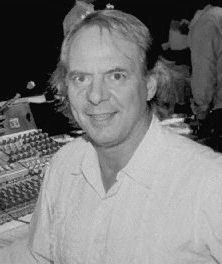Karlheinz Stockhausen (born 1928)
(born Burg Mödrath, 22 August 1928).
German composer of modern music, electronic music and operas. He was
initially influenced by the music of Anton Webern,
and by serialism (a method of
composing non-tonal music). He studied under Olivier
Messiaen in 1952, and his early works, like "Spiel" and "Kreuzspiel",
show the influence of both these masters. He was one of the first composers
to write electronic music, having
first studied phonetics and information/communication theory at Bonn University.
 "Kontakte"
is a compostion which includes a tape playback of electronic sounds which
zip and swirl about via loudspeakers placed around the audience. The "Klavierstücke"
(Piano pieces) start out using strict serial principles (Klavierstücke
I - IV), but later become expansive (VI), exquisite (VII), and even dramatic
(IX and X). "Zyklus", for solo percussion, is written so that the performance
can start on any page, and it may be read upside down, or from right to
left, or not, as the performer chooses. "Refrain" is somewhat meditative
with its rarefied, ringing chords of bell-like sonorities, and occasional
tutti vocalizations by the three instrumentalists.
"Kontakte"
is a compostion which includes a tape playback of electronic sounds which
zip and swirl about via loudspeakers placed around the audience. The "Klavierstücke"
(Piano pieces) start out using strict serial principles (Klavierstücke
I - IV), but later become expansive (VI), exquisite (VII), and even dramatic
(IX and X). "Zyklus", for solo percussion, is written so that the performance
can start on any page, and it may be read upside down, or from right to
left, or not, as the performer chooses. "Refrain" is somewhat meditative
with its rarefied, ringing chords of bell-like sonorities, and occasional
tutti vocalizations by the three instrumentalists.
The piece "Mantra" is written for two pianos, the sounds from which
are modulated in real time by ring modulators. If you are not accustomed
to dissonance, "Stimmung" might be a good place to begin. It is for 6 unaccompanied
singers, with texts based on the names of gods and deities throughout world
history, as well as erotic poems by the composer. The basic musical material
for the entire 70 min. piece is a B-natural 9th chord. "Stimmung" means
"attuning", but also "mood", "disposition", as in "good mood" (guter Stimmung).

Stockhausen has written over 200 individual works for a variety of
musical media. Since 1977, he has been in the process of writing "LICHT",
a massive series of seven operas, each named after a day of the week. Five
of them are completed as of this date (Feb. 1996).
-
"Donnerstag" (Thursday), completed in 1980,
-
"Samstag" (Saturday), completed in 1984,
-
"Montag" (Monday), completed in 1988,
-
"Dienstag" (Tuesday), completed in 1991, and
-
"Freitag" (Friday), completed in 1995.
Only the first two operas have been released as recordings. The series
is expected to be completed by the year 2005.
Stockhausen is a conceptual composer - his texts and his musical designs
reflect occidental and oriental musical concepts, as well as eastern and
western spiritual truths. Every composition is a complete rethinking of
the term "music", incorporating European and non-European tradition, the
latest musical technolgy, and a wide range of musical cultures.
A young Karlheinz Stockhausen can be spotted on the Beatles' famous
Sgt. Peppers Lonely Hearts Club Band album cover.
 "Kontakte"
is a compostion which includes a tape playback of electronic sounds which
zip and swirl about via loudspeakers placed around the audience. The "Klavierstücke"
(Piano pieces) start out using strict serial principles (Klavierstücke
I - IV), but later become expansive (VI), exquisite (VII), and even dramatic
(IX and X). "Zyklus", for solo percussion, is written so that the performance
can start on any page, and it may be read upside down, or from right to
left, or not, as the performer chooses. "Refrain" is somewhat meditative
with its rarefied, ringing chords of bell-like sonorities, and occasional
tutti vocalizations by the three instrumentalists.
"Kontakte"
is a compostion which includes a tape playback of electronic sounds which
zip and swirl about via loudspeakers placed around the audience. The "Klavierstücke"
(Piano pieces) start out using strict serial principles (Klavierstücke
I - IV), but later become expansive (VI), exquisite (VII), and even dramatic
(IX and X). "Zyklus", for solo percussion, is written so that the performance
can start on any page, and it may be read upside down, or from right to
left, or not, as the performer chooses. "Refrain" is somewhat meditative
with its rarefied, ringing chords of bell-like sonorities, and occasional
tutti vocalizations by the three instrumentalists.
